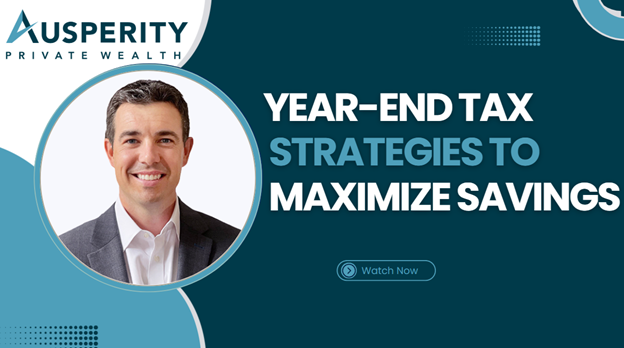By Robert (Rory) J. O’Hara III, CFP®, CRPC™
Is your tax bill dancing in your head instead of sugar plums this holiday season? In this video, Rory O’Hara discusses year-end tax strategies to help you maximize your savings and minimize taxes. You have moves to make by year’s end that can safeguard your pocketbook. Watch this video to learn more.
TRANSCRIPT
Are you concerned about taxes eating into your income and savings this year?
Hi, I’m Rory O’Hara with Ausperity Private Wealth. Our mission is to help clients grow and preserve their wealth. Today, I’ll share year-end tax planning strategies that can help you minimize taxes and maximize savings.
1. Harvest Tax Losses
As you align your portfolio with your goals, consider offsetting capital gains by selling investments that have underperformed. This strategy, known as tax-loss harvesting, can reduce your tax liability for the year.
2. Take Required Minimum Distributions (RMDs)
If you’re 73 or older, ensure you take your RMD by year-end. Missing this distribution could result in a 25% penalty on any undistributed amount.
3. Maximize Retirement Contributions
Contribute the maximum to your retirement accounts:
- $23,000 for your 401(k) (if under age 50).
- $30,500 if you’re over 50.
These contributions lower your taxable income, deferring taxes until retirement.
If you expect to be in a higher tax bracket during retirement, consider converting some of your traditional IRA to a Roth IRA this year. Money in a Roth IRA grows and can be withdrawn tax-free in retirement.
4. Optimize Charitable Giving
Giving can lower your taxes while supporting causes you care about:
- Cash Donations: Deduct up to 60% of your adjusted gross income (AGI).
- Appreciated Assets: Donate long-term appreciated assets like stocks to deduct their full market value (up to 30% of AGI) while avoiding capital gains tax.
- Qualified Charitable Distributions (QCDs): If you’re over 70½, donate directly from your IRA (up to $105,000) to avoid taxes and meet your RMD requirements.
5. Consider a Donor-Advised Fund
A donor-advised fund allows you to:
- Contribute a large amount now, taking a full deduction this year.
- Distribute funds to charities over several years.
This strategy, called bundling, lets you maximize deductions now while using the standard deduction in future years.
Partner with a Financial Advisor
A financial advisor can guide you through these strategies, helping you reduce taxes while maximizing savings. At Ausperity Private Wealth, we work with successful families to optimize their financial futures.To schedule an appointment, call us at 856-252-0102 or visit our website at www.AusperityPrivateWealth.com.
